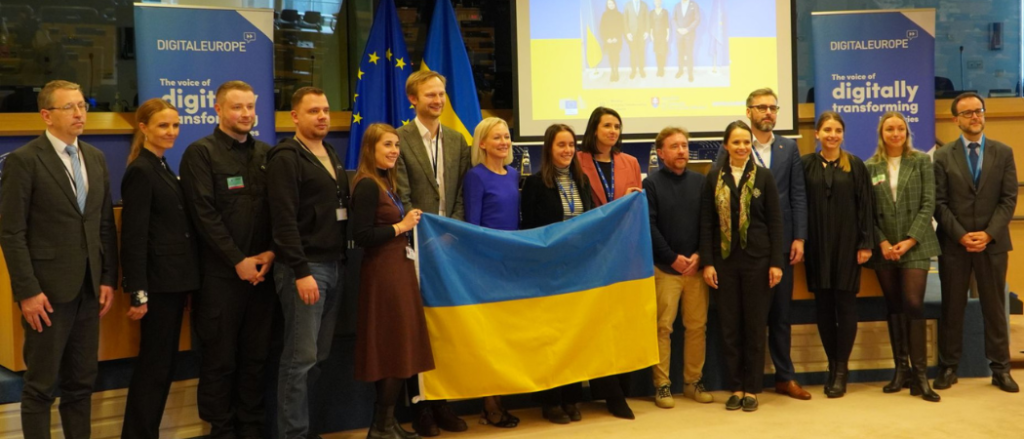Ukraine’s role as test bed for new technologies and a place where adaptable private firms can prosper was showcased at the European Parliament in Brussels
By Thomas Brent
The Technology and Ukraine: Lessons from the front line event at the European Parliament on April 16. Photo credits: Digital Europe
Investing in start-ups in Ukraine is great, but what the country needs from the EU is to incentivise big companies, scale-ups and mid-caps to build a presence in Ukraine, says Sacha Michaud, British tech investor and the co-founder of Spanish delivery app company Glovo.
Speaking at a European Parliament event showcasing technology and innovation in Ukraine, co-organised by Digital Europe, Michaud said he has experience of speaking to entrepreneurs who were not aware it remains possible to expand business into the Ukrainian market.
“Ukraine is a unique place to go right now,” he said. “I’m sure there’s a lot of EU investment in start-ups but I think it’s much better to invest in larger companies, scale ups, to get them to operate in Ukraine. The impact is higher. A start-up takes four or five years [to have the same impact].”
The best way to support innovation and the economy in Ukraine, is by increasing the flow of private capital in the country, said Michaud.
Ukraine is one of Glovo’s leading markets. The company briefly closed operations in the country at the outbreak of the full-scale Russian invasion in February 2022, but Michaud said staff in Ukraine convinced it to re-open. New safety features were swiftly introduced, such as blocking orders during bombing threats. As of March 2023, the team in Ukraine reached 100% of the pre-war level of business. It continues to grow, a spokesperson told Science|Business.
Glovo is not alone in maintaining operations in the country. A recent survey by the American Chamber of Commerce Ukraine found that 86% of its member companies are fully operational,12% are partially operational and 2% have closed. But there are challenges. For example, 30% of the companies reported having infrastructure damage and 85% are concerned about their employees’ health and mental well-being.
To help spread the message that it is still possible to do business in Ukraine, Glovo is organising the inaugural PowerUp Ukraine conference with the Ukrainian Start-up Fund to raise awareness of the country’s tech ecosystem and bring together local start-ups with international companies.
The June conference follows Glovo’s pitch competition last year, which was the first start-up competition held in the country since February 2022.
Ukraine the testbed of future tech
Speaking at the Brussels conference Dragoș Tudorache MEP described Ukraine as a test bed and a lesson that the EU needs to learn from, pointing to its work on digitisation.
Just before the Russian invasion in February 2022, the country rolled out Diia, an app that allows a broad range of public services to be accessed via mobile phones. It has now been downloaded by around 19 million people in Ukraine. Estonia, a leader in e-government services, has taken inspiration from Diia for its own e-state app Mriik.
“Ukraine is not only about war and suffering,” Tudorache said. “It is a story of success, of dynamism, innovation and modernity in the way technology, particularly digital technologies, are revolutionising the way our societies and states function.”
“When I speak to EU ministers I tell them, stop spending millions or billions of EU funds inventing new government clouds or apps to digitise services. You have Diia, it’s already in a nice box with a nice ribbon on top. Take it and you will have a digitalised society,” said Tudorache.
Ukraine is also leading in advances in data storage and transfer, cybersecurity and new defence technology.
“I am convinced that military doctrines are going to be written and rewritten looking at the war in Ukraine today, and how technology – everything from connectivity to AI – is going to influence warfare,” Tudorache said. “We stand to learn from what Ukraine is experiencing every day on the battlefield and about how to integrate new technologies into conducting warfare.”
The EU is taking note. There are plans to open an Innovation Office in Kyiv this year to facilitate collaboration between EU start-ups and Ukraine’s industry and armed forces. The EU will also host an EU-Ukraine Defence Industry forum this year. Support of Ukraine’s defence industry is also one of the goals of the EU’s new European Defence Industrial Strategy (EDIS), announced on 5 March.
One way in which Ukraine has managed to accelerate defence innovation is through the Brave1 initiative, a fast-track pipeline to verify, test, scale up and roll-out citizen designed defence technology.
“Anyone can submit an idea and we can test it, get a clear understanding of if it works and provide grants within around three months,” said Sergiy Koshman, head of international partnerships and cooperation at Brave1.
The unique element of Brave1 is its inclusion of citizen inventors in defence technology. “The difference between Ukraine’s defence tech ecosystem and that of other countries is that […] the majority of people in the west in the defence technology field have a military background. In Ukraine, there are a lot more citizens,” Koshman said. A lesson for the EU could be involving its civil society in its defence tech ecosystem.
